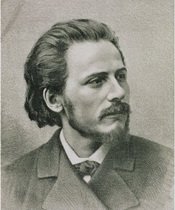(1842-1912)
Jules Massenet was a French composer and the leading French opera composer of his era. A number of his works for the stage are still performed today, including Manon (1884), Cid (1885), Esclarmonde (1889), Werther (1892), Thaïs (1894), Cendrillon (1899), Chérubin (1905) and Don Quichotte (1910). Although his ballets are performed only rarely, Kenneth MacMillan's famous ballet Manon was created for one of his orchestral works.
Massenet was born in Montaud, a village near the city of Saint-Étienne. His mother, a piano teacher who also composed music herself, gave Massenet his first music lessons. In 1847, the family moved to Paris, and Massenet gained admittance to the Conservatoire de Paris in 1852. There, starting in 1861, he would study composition with Ambroise Thomas. As a student, he supported himself by teaching piano and playing timpani at the Théâtre Lyrique. In 1863, he won the Prix de Rome with his cantata David Rizzio. After spending three years in Rome, he returned to Paris in 1866. His first (one-act) opera was presented at the Opéra Comique in 1867. From 1878 to 1896, he taught composition at the Paris Conservatory. He initially established his reputation as a composer of oratorios, all the way up to his 1881 opera Hérodiade, but wide recognition really only came in 1884, with Manon. Commissions then started to arrive from the world's leading opera houses, such as the Wiener Hofoper and Covent Garden. He wrote Don Quichotte in Monte Carlo, and Fyodor Chaliapin would sing the lead.
Massenet employed Wagner's leitmotif technique, but in his own lighter and more melodic style. Much criticised at the time, the practice found more admirers in the second half of the 20th century. In addition to operas, he also composed ballet music, oratorios, cantatas, songs and orchestral works.
Jules Massenet was a French composer and the leading French opera composer of his era. A number of his works for the stage are still performed today, including Manon (1884), Cid (1885), Esclarmonde (1889), Werther (1892), Thaïs (1894), Cendrillon (1899), Chérubin (1905) and Don Quichotte (1910). Although his ballets are performed only rarely, Kenneth MacMillan's famous ballet Manon was created for one of his orchestral works.
Massenet was born in Montaud, a village near the city of Saint-Étienne. His mother, a piano teacher who also composed music herself, gave Massenet his first music lessons. In 1847, the family moved to Paris, and Massenet gained admittance to the Conservatoire de Paris in 1852. There, starting in 1861, he would study composition with Ambroise Thomas. As a student, he supported himself by teaching piano and playing timpani at the Théâtre Lyrique. In 1863, he won the Prix de Rome with his cantata David Rizzio. After spending three years in Rome, he returned to Paris in 1866. His first (one-act) opera was presented at the Opéra Comique in 1867. From 1878 to 1896, he taught composition at the Paris Conservatory. He initially established his reputation as a composer of oratorios, all the way up to his 1881 opera Hérodiade, but wide recognition really only came in 1884, with Manon. Commissions then started to arrive from the world's leading opera houses, such as the Wiener Hofoper and Covent Garden. He wrote Don Quichotte in Monte Carlo, and Fyodor Chaliapin would sing the lead.
Massenet employed Wagner's leitmotif technique, but in his own lighter and more melodic style. Much criticised at the time, the practice found more admirers in the second half of the 20th century. In addition to operas, he also composed ballet music, oratorios, cantatas, songs and orchestral works.
